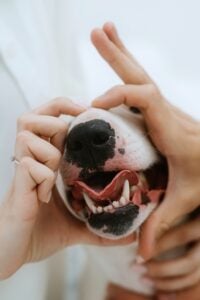Busting Common Dental Myths Among Charlottesville Pet Owners
Table of Contents
Charlottesville pet owners are known for treating their pets like family, from Saturday walks through Pen Park to cozy evenings at home. But when it comes to dental health, even the most devoted owners often fall for myths that sound harmless but quietly lead to bigger problems. In reality, these common beliefs can cause pain, infections, and long-term health issues that go far beyond the mouth.
In this article, we’ll uncover the top dental myths Charlottesville pet owners still believe, explain why they persist, and share what you really need to know to keep your pet’s teeth and overall health in great shape.
1. “Bad breath is just part of being a pet.”
Many pet owners assume that a little dog breath or cat breath is normal. But that’s not the case. Persistent foul odour is often a sign of gum disease, infection, or tartar build-up beneath the gums.
When you live in a small city like Charlottesville and your pet spends time chewing their favourite toy under the Oak Ridge pines, you may think the smell is just their normal. But in reality, it’s a warning. A healthier mouth should not consistently smell bad.
What to do:
Lift the lip, check for red/swollen gums or heavy tartar, and schedule a dental check-up.
2. “If the teeth look white, the mouth is healthy.”
It’s easy to assume that bright white crowns mean your dog or cat is fine, but that’s misleading. Much of the disease happens under the gumline, out of sight. At our state-of-the-art facility near Stonefield Shopping Center, we often see pets come in with deceptively clean-looking teeth but hidden pockets of disease.
What to do:
Ask if your vet can take dental X-rays and check roots/bone, not just the visible enamel.
3. “Dry kibble or a bone will clean my pet’s teeth.”
You might hear that feeding crunchy dry food or giving bones will keep your pet’s teeth clean. Unfortunately, that’s mostly myth. Many dry foods crumble too easily to provide meaningful abrasive cleaning, and bones (or very hard chews) can fracture teeth.
In Charlottesville, especially, where pets might have access to soft treats and human food, assuming the kibble takes care of everything can be risky.
What to do:
Consider specially formulated diets or dental chews with the VOHC (Veterinary Oral Health Council) seal, and pair those with brushing and professional cleanings.
4. “My pet is too old for dental cleaning.”
One of the most persistent local beliefs: “Buddy’s 12 years old now, it’s too late for a cleaning.” Actually, age by itself isn’t a reason to avoid dental work. With proper screening and monitoring, anesthesia for dental procedures is quite safe, and the risk of untreated dental disease may be much higher.
At Autumn Trails Veterinary Center, we perform pre-op bloodwork and tailor anesthesia protocols to each pet. The payoff is improved eating, better energy, and fewer hidden infections.
What to do:
Don’t let age scare you. Ask your veterinarian about the risks vs. benefits for your older pet, and when a dental exam might be worthwhile.
5. “At-home care alone is enough.”
It’s great if you brush your pet’s teeth or give dental chews, but those alone are not sufficient to prevent or treat the full spectrum of dental disease. Many issues occur beneath the gumline where home tools don’t reach.
In Charlottesville homes where pets live indoors, maybe on hardwood floors or occasionally surf the lawn at dusk, adding professional cleanings is the missing step.
What to do:
Establish a consistent at-home routine (e.g., using toothbrushes and toothpaste designed for pets) and pair it with annual professional dental exams and cleanings.
Tips for Charlottesville Pet Owners

- When you visit our facility near Route 29/Emmet Street, bring any chews or diets your pet uses. We’ll advise which is best.
- For busy pet parents working at UVA or around Charlottesville, ask about drop-off boarding and dental scheduling options.
- After a dental cleaning, make sure you understand the home care follow-up steps: new chew suggestions, an appropriate diet, and brushing tips.
- For pets with existing health conditions (e.g., heart or kidney issues), dental health becomes even more critical gum disease bacteria can affect other organs.
- Use a reward-based approach. Start brushing sessions with just a few seconds, and use praise or treats to make dental care positive, benefiting both you and your pet.
At Autumn Trails and Veterinary Center, we offer a range of dental services, from cleanings to dental extraction, to help keep your pet’s mouth looking and feeling great. We are located in Charlottesville, VA. Appointments are conveniently available; call us at 434-971-9800.
FAQs
- Is bad breath normal in pets?
No. Persistent foul breath is typically a sign of gum disease or poor oral hygiene and warrants a dental exam.
- Will dry food keep my pet’s teeth clean?
Simply feeding dry kibble doesn’t reliably prevent dental disease; chewing alone is no substitute for brushing and professional care.
- My older pet is too frail for anesthesia is dental cleaning safe?
Age alone doesn’t make anesthesia unsafe; many older pets benefit from cleanings when proper pre-op checks are done.
- Bones or chew toys are enough for dental health, right?
They may help somewhat, but bones can fracture teeth and chews alone cannot reach under the gums where major problems develop.
- If I brush my pet’s teeth at home, do they not need professional cleaning?
Brushing is excellent, but it doesn’t remove disease below the gumline, so professional cleanings are still needed.




